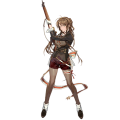Ranking of this Doll's specs relative to other Dolls of the same type.
Lee-Enfield: Difference between revisions
No edit summary |
HellScythe42 (talk | contribs) mNo edit summary |
||
| Line 52: | Line 52: | ||
|costume2= Lifelong Protector | |costume2= Lifelong Protector | ||
|costume3= Onion Shooter | |costume3= Onion Shooter | ||
|costume4= [ | |costume4= [Digimind Upgrade] | ||
|gallery=<gallery> | |gallery=<gallery> | ||
| Line 58: | Line 58: | ||
File:Lee-Enfield.png|Full artwork | File:Lee-Enfield.png|Full artwork | ||
File:Lee-Enfield_D.png|Full damaged artwork | File:Lee-Enfield_D.png|Full damaged artwork | ||
File:Lee-Enfield_costume4_S.png| | File:Lee-Enfield_costume4_S.png|Digimind Upgrade profile image | ||
File:Lee-Enfield costume4.png| | File:Lee-Enfield costume4.png|Digimind Upgrade full artwork | ||
File:Lee-Enfield_costume4 D.png| | File:Lee-Enfield_costume4 D.png|Digimind Upgrade full damaged artwork | ||
File:Lee-Enfield_costume1.png|"Huntress' Frock" artwork | File:Lee-Enfield_costume1.png|"Huntress' Frock" artwork | ||
File:Lee-Enfield_costume1_D.png|"Huntress' Frock" damaged artwork | File:Lee-Enfield_costume1_D.png|"Huntress' Frock" damaged artwork | ||
Revision as of 13:47, 8 October 2022
| Lee-Enfield | Quotes | Live2D |
Lee-Enfield 50   | |
| Gun Information | |
|---|---|
| Full name | Lee–Enfield |
| Country of origin | United Kingdom |
| Manufacturer | Royal Small Arms Factory Enfield, The Birmingham Small Arms Company, London Small Arms, Lithgow Small Arms, ROF Fazakerley, ROF Maltby, Savage Arms Company, Long Branch Arsenal, Ishapore Rifle Factory |
| Game Information | |
| Faction | Griffin & Kryuger |
| Manufactured / Revised by |
I.O.P. |
| Voice actor | Tomatsu Haruka |
| Artist | rei |
| Released on | CN (李-恩菲尔德), TW (李-恩菲爾德), KR (리-엔필드), EN (Lee Enfield), JP (リー・エンフィールド) |
| Chibi Animation | |
| Variant:
Click the marked area to switch between animations. For details regarding animations, please see Animations on the Wiki. | |
| View page template | |
How to obtain
NORMALHEAVY Timer 5:00:00. See T-Doll Production for details.
DROP Not obtainable as a drop.
REWARD Not obtained as a reward
Exclusive Equipment
Union Skill
There is no union skill for this T-Doll.
Stats / Data
| 40(x1) → 80(x1) / 400(x5) | 15(x1) / 55(x5) | 30(x1) / 90(x5) |
|
| ||||||||
|
| ||||||||
| 7 | 0 | ||||||||
| 40% | 50% | ||||||||
| 15 |
Ranking of this Doll's specs relative to every other Doll.
Weapon Background
The Lee-Enfield is a bolt-action, magazine-fed, repeating rifle that served as the main firearm used by soldiers of both the British Empire and the British Commonwealth. It was derived from the earlier Lee–Metford, a mechanically similar black-powder rifle which combined James Paris Lee's rear-locking bolt system with a barrel featuring rifling designed by William Ellis Metford. Variants of the Lee-Enfield would serve as the standard infantry rifle of the British army from 1895 to 1957.
The Lee action cocked the striker on the closing stroke of the bolt, making the initial opening much faster and easier compared to the "cock on open" design of the Mauser Gewehr 98. The rifle was also equipped with a detachable, 10-round, double-column box magazine, a very modern development in its day. The Lee–Enfield was adapted to fire the .303 British cartridge, a rimmed, high-powered rifle round. Experiments with smokeless powder in the existing Lee–Metford cartridge seemed at first to be a simple upgrade, but the greater heat and pressure generated by the new smokeless powder wore away the shallow, rounded, Metford rifling after approximately 6000 rounds. Switching to a new square-shaped rifling system designed at the Royal Small Arms Factory (RSAF) Enfield solved the problem, and thus the Lee–Enfield was born.[1]
The No.1 Mk.III SMLE is perhaps the best known member of the Lee-Enfield family. The first rifles to be given the SMLE (Short, Magazine, Lee-Enfield) designation arrived in 1904. The most substantial upgrades made were the shortening of the barrel and the introduction of a stripper clip guide on the bolt head. It is also here that the Lee-Enfield would gain one of its most defining visual features: its trademark blunt nose cap. These early SMLE rifles are known as 'Mk.I' pattern rifles. Three years after the Mk.I, the SMLE No.1 Mk.III was developed. The Mk.III featured a new rear sight, and the stripper clip guide was moved to a fixed location on the receiver bridge. The chambers were revamped to handle firing the improved Mk VII ammunition, which featured a pointed 'Spitzer' pattern bullet.[2]
The No.1 Mk.III would be the standard infantry rifle of British forces during the First World War. During the war, manufacturers couldn't keep up with the demand for new rifles. In late 1915 the Mk III* was introduced, which incorporated several changes designed to ease manufacturing. The most prominent changes were the exclusion of the magazine cutoff system and long-range volley sights present on earlier models of the Lee-Enfield. The rear sights were also simplified, and could no longer be adjusted for windage. Rifles with some or all of these features present are found, as the changes were implemented at different times in different factories and as stocks of parts were depleted.[3]
Aside from the legendary Mk.III SMLE, the other most well-known variant of the Lee-Enfield is the No.4 Mk.1 rifle. Developed in the early 1930's, the No.4 was designed to be simpler to mass-produce than previous iterations. It did away with the iconic nose cap of the SMLE, and features a simplified but stronger action and a heavier barrel. The rear sight was redesigned yet again, and a new spike bayonet was issued instead of a blade bayonet. The No. 4 rifle was also heavier than the No.1 Mk.III, largely due to its heavier barrel. The No.4 Mk.1 would primarily be wielded by British forces during the Second World War.[4]
The Lee-Enfield would see mainline service until 1957, when it was replaced as the British military's standard issue rifle by the L1A1 SLR (the British version of the Belgian-designed FAL rifle). Even after this point, however, the Lee-Enfield would continue to see limited use as a sniper rifle, with versions rechambered for 7.62 NATO being used during the Falklands War. It wouldn't be until the introduction of the L96A1 in 1982 that the Lee-Enfield would be fully retired from British service. In other parts of the world, the venerable rifle continued to serve dutifully. The Canadian Rangers, a paramilitary group specializing in combat and survival in the Canadian wilderness, didn't begin phasing out the Lee-Enfield until 2016, and it continues to be used by various rebel groups and police forces across the world.
Lee–Enfield rifles remain very popular in the civilian shooting scene, with many being used as hunting rifles and target shooting rifles. Lee-Enfield pattern rifles are a common sight in the military surplus market, as many Lee–Enfield rifles were sold in Australia, Canada, New Zealand, South Africa, the United Kingdom, and the United States after the Second World War. Many people still hunt with as-issued Lee–Enfield rifles, with commercial .303 British ammunition proving especially effective on medium-sized game. The Lee–Enfield rifle is also a popular gun for historic rifle enthusiasts, with organizations such as the Lee-Enfield Rifle Association assisting in not just preserving rifles in shooting condition but holding events and competitions. The Lee–Enfield remains a favorite with competitors in service rifle competitions in many Commonwealth countries, due to their prohibitions/restrictions on the legal ownership of semi-automatic centerfire rifles.
Gallery
Main artwork
Gallery consisting of artworks used primarily in-game. For information on how to obtain certain costumes, see Skin Catalogue.
-
Profile image
-
Full artwork
-
Full damaged artwork
-
Digimind Upgrade profile image
-
Digimind Upgrade full artwork
-
Digimind Upgrade full damaged artwork
-
"Huntress' Frock" artwork
-
"Huntress' Frock" damaged artwork
-
"Lifelong Protector" artwork
-
"Lifelong Protector" damaged artwork
-
"Onion Shooter" artwork
-
"Onion Shooter" damaged artwork
Alternative artwork
Alternate gallery consisting of artworks with slight alterations as well as miscellaneous artworks.
-
Full damaged artwork (Censored)
Trivia
- During the First World War, the term 'mad minute' was coined by British troops. It referred to a technique for quickly operating the Lee-Enfield that enabled the shooter to perform 15 hits on a 300 yard target in 60 seconds or less. Several First World War accounts tell of British troops repelling German attackers who subsequently reported that they had encountered machine guns, when in fact it was simply a group of well-trained riflemen armed with SMLE Mk.III rifles.[5]
- The rifle variant specific to Girls' Frontline is the No.4 Mk.1 (T), the sniper rifle version of the No.4 Mk.1 rifle used in World War 2. The (T) stands for 'Telescope', the term used at the time to refer to a magnified optic. Test batches of No.4 Mk.1 rifles would be fired, and the most accurate of these would be sent to the famous British gunsmiths Holland & Holland. There they would receive a scope matched to the rifle by serial number, and a walnut cheek rest on the stock.[6]
- Much like the M1903 Springfield's Pedersen Device, attempts were made at converting the Lee-Enfield from a bolt-action rifle into a semi-automatic one. One such experiment utilized a custom device designed by Russell Turner during World War 2 for use by the Canadian Army. Turner's design consisted of a long stroke gas piston, a hammer-firing trigger mechanism, and a tilting locking block in place of the standard Lee-Enfield bolt. The Turner device was rejected and never saw service, mainly due to its mechanical complexity.
References
| List of T-Dolls |
|---|



























